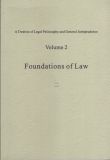用户登陆搜 索 |
查看图书
图书目录:A Note on the Authors
Preface Chapter 1 -What Does "Foundations" Mean? 1.1. Basic, Fundamental Concepts 1.2. Basic Research 1.3. Logical and Epistemological Foundations 1.4. Moral or Legitimacy Foundations 1.5. Historical, Genetic Foundations of Law 1.6. Extra-legal Foundations of Law 1.7. Preconditions for the Efficacy of Law Chapter 2 - The Explanandum: What Is Law? 2.1. Normativism and Realism 2.2. Concept of Law and Theory of Law 2.3. Concept of Law and Ideal or Idea of Law 2.4. Actor and Observer--Internal and External Point of View 2.4.1. Actor and Rules 2.4.2. Actor and Observer 2.4.3. A Proposal: Scaling Internality 2.5. The Concept of Law-A Realist Approach 2.5.1. Regularities and Rules 2.5.2. A Realist Approach to Legal Norms 2.5.3. Etatism versus PLUralism 2.5.4 Realism in Practice: Socio-Lega/ Research 2.6. Dimensions of a Legal Order 2.7. Functions of Law Chapter 3 - Extra-Legal Foundations of Law--Variations on Legally External Foundations 3.1. Transcendent Foundations of Law 3 1.1. Mythological Foundations of Law 3.1.1.1. On the Notion of Myth 3.1.1.2. The Oresteia of Aeschylus 3.1.1.3. Sophocles' Antigone 3.1.2. Religious Foundations of Law 3.1.2.1. The Process of Civilization in Jewish Law 3.1.2.2. Christian Elements 3.1.2.3. Islamic Law 3.2. Immanent but Legally External Foundations of Law 3.2.1. Natural Foundations of Law 3.2.1.1. Natural, Extra-Human Foundations: Montesquieu (1) The Approach (2) Counsel to the Legislator (3) Explanations of Social Institutions (4) Resume (5) After Montesquieu (6) Recent Studies 3.2.1.2. Natural, Human Foundations of Law: Biology and Anthropology 3.2.1.3. The Cognitive Foundations of Law-- An Introduction to the Mentalist Theory of Ethics and Law (by Matthias Mahlmann) 3.2.1.3.1. The Human Rights Culture and Its Philosophical Reflection 3.2.1.3.2. The Moral Faculty and Human Rights 3.2.1.3.3. The Properties of the Moral Faculty and the Problem of Justification 3.2.1.4. Natural Law Theories--Problems of Transition 3.2.2. Economic Foundations of Law 3.2.2.1. The Economic Foundationalism of Marx and Engels: Basic Assumptions 3.2.2.2. Critique 3.2.2.3. The Future of Law 3.2.2.4. Economic Analysis of Law 3.2.3. Moral Foundations of Law 3.2.3.1. Law and Morality 3.2.3.2. Emile Durkheim (1) The Approach (2) Law as an Indicator of Social Solidarity (3) Law as an Instrument of Social Integration (a) The Problem of Social Integration (b) Private Law: the Extra- Contractual Foundations of Contracts (c) Penal Law: Crime and Punishment-- Innovation and Integration (d) The Law of the Welfare State: Integration, Inclusion, and Exclusion 3.2.4. Societal Foundations of Law: Eugen Ehrlich 3.2.5. Political Foundations of Law 3.2.5.1. Law and State 3.2.5.2. Law and Politics 3.2.5.3. Law and Power (Violence, Force) 3.2.6. Historical Foundations of Law Chapter 4 - Internal Foundations of Law 4.1. Kelsen's Grundnorra 4.2. Luhmann's Autopoietic Theory of Law 4.3. Fuller's Internal Morality of the Law Chapter 5 - Anti-Foundationalism Chapter 6- General Tendencies 6.1. Secularization? 6.2. Further Secularization of Explanations and Justificationsm Internalization Chapter 7- Problems of Explanation Chapter 8 - Summary Bibliography Index of Subjects Index of Names |

